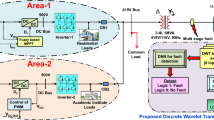Abstract
In power distributed generation system, analysis of power quality is a major issue and hence it is essential to implement an efficient power quality system. To address and end this issue, the proposed work is mainly focused on the detection and classification of power quality disturbances or events by applying Hilbert–Huang transform (HHT) technique. HHT technique is a novel signal processing algorithm that comprises two processes. First is the empirical mode decomposition (EMD), which is an iterative process where N number of power quality signals are decomposed into intrinsic mode functions (IMFs). The second process, Hilbert transform, is applied to each IMF component. The advantage of using these two processes makes it an attractive power tool for quality event analysis. Once the IMF is obtained, it is easy to construct a time–frequency representation model. Then, the significant features are extracted from amplitude, phase and frequency instantly, which are the contour of IMFs of each power quality disturbance. For classification, adaptive neuro-fuzzy system (NFS) classifier is used. It is an intelligent system used for the combination of neural network and fuzzy logic. Power quality features are given as input to the NFS system. The experimental simulation is conducted in a MATLAB environment, and proposed HHT has higher efficiency compared to existing methods.








Similar content being viewed by others
References
Bouhali R, Tadjine K, Bendjama H, Saadi MC (2018) Fault diagnosis of bladed disc using wavelet transform and ensemble empirical mode decomposition. Aust J Mech Eng 16(2):1–11
Cai J, Li X (2016) Gear fault diagnosis based on empirical mode decomposition and 1.5 dimension spectrum. Hindawi Publishing Corporation, London, p 10
Dehghani MJ (2009) Comparison of S-transform and wavelet transform in power quality analysis. Int J Electr Comput Eng 3(2):395–398
Enshaee A, Enshaee P (2018) A new S-transform-based method for identification of power quality disturbances. Arab J Sci Eng 43(6):2817–2832
Han H, Cho S, Kwon S, Cho SB (2018) Fault diagnosis using improved complete ensemble empirical mode decomposition with adaptive noiseand power-based intrinsic mode function selection algorithm. J Electr 7(2):16
Hossain E, Rida M, Sanjeevai kumar P, Salim AY, Khan I (2018) Analysis and mitigation of power quality issues in distributed generation systems using custom power devices. IEEE Access 6:16816–16833
Labate D, Foresta FL, Occhiuto G, Morabito FC, Ekuakille AL, Vergallo P (2013) Empirical mode decomposition vs. wavelet decomposition for the extraction of respiratory signal from single-channel ECG: a comparison. IEEE Sensors J 13(7):2666–2674
Lu CL, Huang PH (2013) Power system stability study with empirical mode decomposition. Adv Mater Res 732–733:905–908
Manikandan MS, Samantaray SR, Kamwa I (2014) Detection and classification of power quality disturbances using sparse signal decomposition on hybrid dictionaries. IEEE Trans Instrum Meas 64:27–38
Polat Uzunoglu C (2018) A comparative study of empirical and variational mode decomposition on high voltage discharges. Electrical 18(1):72–77
Ray P, Budumuru GK, Mohanty BK (2018) A comprehensive review on soft computing and signal processing techniques in feature extraction and classification of power quality problems. J Renew Sustain Energy 10(2):025102
Salem Abozaed ME (2013) Detection and classification of power quality disturbances using S-transform and wavelet algorithm. Int J Electr Comput Eng 7(6):280–287
Shukula S, Mishra S, Singh B, Kumar S (2017) Implementation of empirical mode decomposition based algorithm for shunt active filter. IEEE Trans Ind Appl 53(I3):2392–2400
Uyar M, Yildirim S, Gencoglu MT (2009) An expert system based on S-transform and neural network for automatic classification of power quality disturbances. Expert Syst Appl 36:5962–5975
Zhao L, Huang D, Qin Y (2015) Fault diagnosis for gearbox based onimproved empirical mode decomposition. Hindawi Publishing Corporation, London, p 9
Author information
Authors and Affiliations
Corresponding author
Ethics declarations
Conflict of interest
No conflicts of interest: Author 1, 2, and 3 declare that they have no conflict of interest.
Research involving human participants and/or animals
All procedures followed were in accordance with the ethical standards of the responsible committee on human experimentation (institutional and national) and with the Helsinki Declaration of 1975, as revised in 2008.”
Informed consent
Informed consent was obtained from all patients included in the study.
Additional information
Communicated by V. Loia.
Publisher's Note
Springer Nature remains neutral with regard to jurisdictional claims in published maps and institutional affiliations.
Rights and permissions
About this article
Cite this article
Kiruthiga, B., Narmatha Banu, R. & Devaraj, D. Detection and classification of power quality disturbances or events by adaptive NFS classifier. Soft Comput 24, 10351–10362 (2020). https://doi.org/10.1007/s00500-019-04538-7
Published:
Issue Date:
DOI: https://doi.org/10.1007/s00500-019-04538-7




